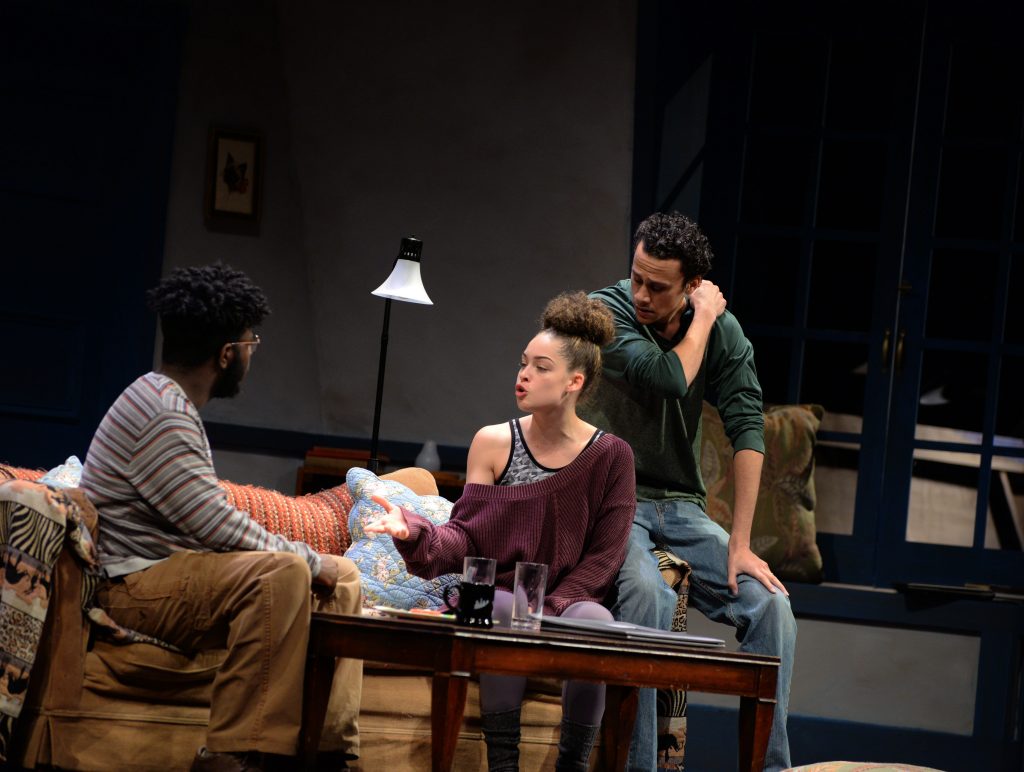
From the first moment of “Belleville,” tension is palpable, shocking and disconcerting. The play opens to modern French reggae and a series of fights between Abby and Zach, where the lines between sensuality and anger are difficult to draw. From the first interaction between these characters, marital anxieties are immediately on display.
In this first scene, they’re both home from work in the afternoon. Abby, played by Liz Sierra, a junior double-majoring in theatre and Spanish, spent money with her husband’s new credit card. Zach, played by Trey Santiago, a senior majoring in theatre, seems to have spent the day watching porn, rather than working — he’s a doctor for Doctors Without Borders. This scene encompasses the central energy of “Belleville”: deliciously confusing, stressful and strangely funny.
The first Binghamton University Mainstage play of the season, directed by Anne Brady, professor of theatre at BU, “Belleville” tells the story of Zach and Abby’s life in a trendy neighborhood in Paris, whose picturesque marriage is clearly not what it seems. With the complicated friendship of another couple — Senegalese immigrants Alioune and Amina (played by Robert Edwards, a junior majoring in theatre, and Mayah Wells, a sophomore majoring in theatre) — the once-bright Belleville becomes dark and menacing.
“I feel like working with a smaller cast allows you to really think about every single thing you do,” Edwards said. “In a bigger cast, sometimes that gets lost.”
Written by Amy Herzog, “Belleville” is a thriller in the style of Alfred Hitchcock films. Brady said that it is difficult to create that kind of intensity onstage.
“I need to find places to set up suspense and set up possible places of conflict that intrigue the audience,” Brady said.
In order to establish this dynamic between characters, Brady worked privately with each actor in the four-person cast. Edwards said that working with Brady helped him better understand the play.
“[Advice from Brady] is just more vision that fuels your intention and your objectives and how you want to affect the other characters,” Edwards said.
Awareness onstage is one of many challenges facing Edwards and Wells, both of whom are making their Mainstage debut in “Belleville.” The characters have dialogue both in English with Senegalese accents, as well as in French. Edwards, who has been taking Spanish courses for three semesters at BU, has no experience with French.
Dora Polachek, visiting associate professor in the department of romance languages, assisted the actors with the French dialogue. As for the Senegalese dialect, Brady reached out to Ibra Sene, associate professor of history and global and international studies at The College of Wooster, whose research examines French Colonial Senegal and Senegalese immigrants to France. The cast had the opportunity to video call with Sene, along with his family, to learn about their culture and speech.
“[Sene] had also read the play, so he gave us some feedback and thoughts about that,” Brady said.
Much of the research for the show was conducted by the actors themselves. While one may assume “Belleville” has a dramaturge — a professional who researches and consults on the playwright, the play and its cultural context — Brady said it’s actually beneficial to the production to have actors do this work.
“They come up with things that can help them in the world of the play, and then we can talk about it,” Brady said. “I think it’s useful for actors in training to do that.”
Wells said she found frightening similarities between the experiences of Senegalese immigrants in France and the experiences of black Americans throughout her own research.
“Well, people usually think that Paris is kind of like the most amazing place to be, and it’s lovely — Eiffel Tower, beautiful romance, everything like that,” Wells said. “But, for people of color, it’s completely different.”
Edwards said that he hopes students of color will come see “Belleville” — starring four nonwhite students — and learn about the theatre department’s opportunities. Having the four leads be people of color is “wonderful,” Edwards said, especially in a play where race is such a central theme.
“I think we have a terrific group — a fabulous group of actors who are just giving their all — their heart, their soul, their guts, their humor,” Brady said.
“Belleville” debuts in the Anderson Center’s Chamber Hall this Friday, Oct. 20 at 8 p.m., and runs on Oct. 21, 27 and 28 at 8 p.m., as well as Oct. 29 at 2 p.m. Tickets are available online and at the box office, and are $10 for students and $18 for the public. On opening night, tickets will be $5 for students at the box office only.


